Trump Dumps Paris
Air Date: Week of June 2, 2017
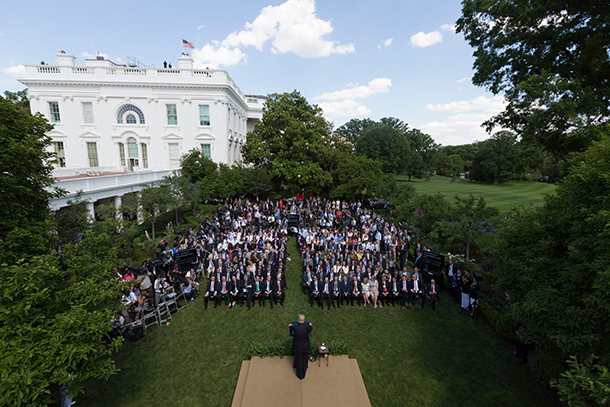
President Trump addressed a small crowd in the Rose Garden on June 1st. (Photo: Official White House Photo by Joyce N. Boghosian)
In a Rose Garden announcement, President Trump declared that the Paris Climate Agreement is a bad deal for the U.S. and would kill American jobs. But peer governments, businesses, scientists and American citizens are voicing fierce opposition to this decision. Alden Meyer of the Union of Concerned Scientists filled in host Steve Curwood on what Trump’s decision means for America and the world.
Transcript
CURWOOD: From PRI, and the Jennifer and Ted Stanley Studios at the University of Massachusetts Boston, this is Living on Earth. I’m Steve Curwood.
President Trump declared June 1st that the United States is withdrawing from the Paris agreement to address global warming, leaving more than a 190 nations behind, who still agree, and joining two others that don’t -- Syria and Nicaragua. And Nicaraguan delegates say they didn’t like the deal because it didn’t go far enough to protect the planet. President Trump campaigned against the Paris accord, and despite pleas to remain from many other governments, businesses, scientists and active citizens, he went to the Rose Garden to fulfill his pledge.
TRUMP: As President, I have one obligation, and that obligation is to the American people. The Paris Accord would undermine our economy, hamstring our workers, weaken our sovereignty, impose unacceptable legal risk, and put us at a permanent disadvantage to the other countries of the world. It is time to exit the Paris accord. [APPLAUSE]
CURWOOD: To explain what that means for the US and the planet we turn now to Alden Meyer, who is director of strategy and policy for the Union of Concerned Scientists. Alden, welcome back to Living on Earth.
MEYER: Glad to be with you again, Steve.
CURWOOD: And as I recall, you've been following the international climate negotiations for, what, 27 years?
MEYER: That's right. The original negotiations leading up to the Rio treaty in 1992 and then on to Kyoto and Bali and Paris, and here we are.
CURWOOD: So, what's your reaction to President Trump's decision to withdraw the United States from the Paris agreement?
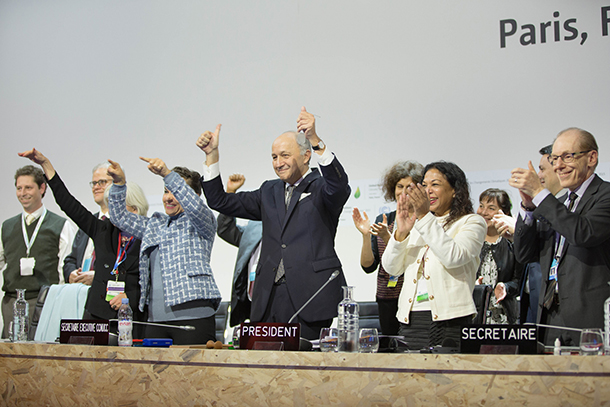
UN climate change leaders shared a moment of joy at the establishment of the landmark international climate agreement in Paris, France, December 12, 2015. 195 nations have signed onto the agreement. (Photo: UNclimatechange, Flickr CC BY 2.0)
MEYER: Well, it's a very sad day. It's a reckless decision. He sold it with a mix of half-truths and outright lies about what Paris is, what it does, what its implications are for the United States. Clearly, he doesn’t understand what's in the agreement, how it works, the notion he's going to get any country to join him at the table to renegotiate this deal is laughable if it wasn't so sad. The reality is, it's cover for an unwillingness to do anything that discomforts his friends in the coal and oil industry and hurt short-term profits, and the irony is it comes at the expense of the very voters that put him in office and that he purports to represent. The impacts on climate change are just as serious in Paris, Kentucky, as they are in Paris, France, and the mayor of Pittsburgh has already responded that he intends to keep pushing forward with climate action in Pittsburgh to try to generate clean energy jobs for people that are unemployed in Pittsburgh. So, it's misleading, and really it's a sad day and it's going to have a devastating impact on America's reputation around the world and the administration's ability to get much done on other issues they care about, where leaders would have to make what would be seen as concessions to this president in front of their own voters.
CURWOOD: Now, President Trump made a big point of saying that the Paris agreement is unfair to the United States. So, to what extent is he accurate in that analysis?
MEYER: Well, again, it just shows how little he understands about it. As you know, Steve, Paris asked countries to put forward their own commitments - what they thought they could do, what they thought was fair. There was no analysis or comparison of those, no scorekeeping, no negotiations, and backroom bunkers the way there was in Kyoto, for example, between the European Union, Japan, and the US on the famous Kyoto targets. So every country put forward what they thought was fair from their point of view, and all those proposed commitments were accepted and embodied in the Paris agreement with the understanding that everyone was going to have to come back to the table and do more down the road if we were going to meet the temperature limitation goals in Paris, which are quite ambitious.
So, the president just doesn't understand what the meaning of word “fair” is. There are also outright myths and lies about what countries like China and India have to do. The notion that because China took on a target to stabilize its national emissions in 2030 means they get a free pass or a free ride for the next 15 in years is laughable. China has to do a yeoman's work to the carbonize its electricity sector, invest in renewable energy -- electric vehicles, to meet what is a fairly ambitious target. The good news is China appears to be well ahead of schedule and will peak their national emissions well before 2030, but the notion that somehow that was unfair to the United States and China had to do nothing is just absurd.
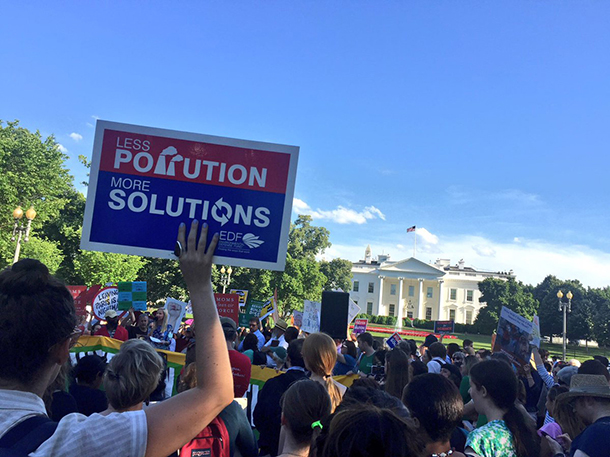
Protestors gathered in front of the White House after President Trump’s announcement that he will pull the United States out of the Paris Agreement. (Photo: Public Citizen)
CURWOOD: Now, a technical question for you, Alden. As I understand it, the rules of the Paris agreement require four years for a party to get out. So, what does this mean, in terms of what President Trump has said? What's he going to do for these next four years, if I have that right?
MEYER: Well, you're right, Steve, a country has to wait until three years after entry in the force of the Paris agreement, which was early November of last year before they can formally notify the Secretary General of United Nations of their intent to withdraw, and then they have to wait one year after that to actually formally withdraw. So, the irony here is the first day that President Trump could legally withdraw the United States from the Paris agreement is the day after the 2020 presidential election in November. So, there's this notion that we're pulling out. It really doesn't mean anything. It's all drama and show and a lot of noise signifying nothing.
CURWOOD: So, we will continue to be part of the Paris accord -- we being United States -- but what kind of legitimacy will we have in the process and how will this affect us in the broader negotiations, the framework convention on climate change? The conference of these parties is in Bonn this next November. We haven't pulled out of the framework convention. What kind of legitimacy do we now have in this climate negotiation process?
MEYER: Well, I think almost none, or I would say probably none. I mean, technically, yes, we have a right to be at the table, but now the president has formally disavowed Paris and dissed the rest of the world, really doesn't understand what the agreement is, claims it's unfair to the US, wants to renegotiate it. I don't think people are going to want to have too much to do with the US delegation at these talks.
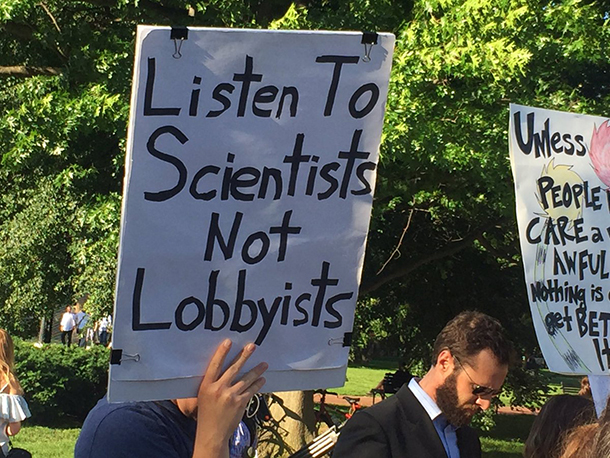
A sign from the protest following President Trump’s announcement. Critics of President Trump’s decision say that in withdrawing the U.S. from the Paris climate deal, Trump disregarded science and sought to please friends in the fossil fuel industry. (Photo: Public Citizen)
And, of course, Paris was the culmination of 25 years of work under the framework convention adopted in Rio, so the notion that you can disavow this truly global effort to come to grips with the climate crisis and then pretend to be concerned about climate change and come to the meetings and participate actively I think will be rejected. I think that the US will be treated like a pariah at these negotiations for the next four years unless there is an about-face by the president before his term is up.
CURWOOD: Alden, how much of a blow to developing countries is President Trump's halting of US payments to the green climate fund?
MEYER: Well, there's two factors there, Steve. One is, we don't yet know how Congress is going to respond to the President's proposed budget and, of course, under our constitution, unless the President decides to ignore it, he does not have the power of the purse. “The president proposes, Congress disposes," is the famous phrase, and there's already been indications from both Republicans and Democrats on the Hill that they reject the deep cuts in foreign aid, including in climate and energy assistance that the administration has put forward.
The other factor we don't know is how much will other countries -- both the other developed countries like Germany, Japan, United Kingdom, France, as well as other major countries like China, which are now in the development finance game -- how much will they do to try to make up some of the shortfall created by whatever the US ends up doing. But there's no doubt that the US will not be doing our fair share of the lift here. We had a big role in creating this problem with our past emissions. On the impact side, we have a responsibility to help those countries deal with those impacts.
It's also in our economic and security interest to help developing countries grow their economies in a different way than we did because if they replicate our fossil fuel intensive development path of the 1800s and 1900s, it's game-over in terms of the climate. So, we have self-interest as well as ethical obligations at play here, and luckily there are a number of thoughtful Republican members and senators on the Hill that understand that.
CURWOOD: Alden, how optimistic are you about the rest the world carrying forward with Paris?
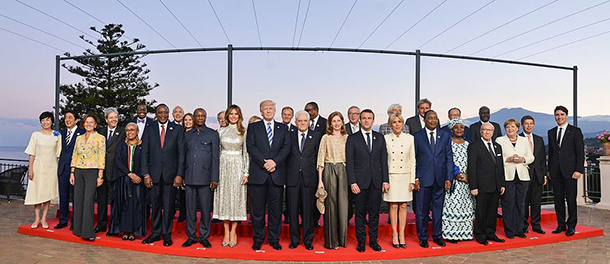
The other leaders in the G7 – seen here at the Taormina, Italy meeting on May 26, 2017 -- attempted to persuade President Trump to keep the U.S. in the Paris Agreement, but their efforts ultimately failed. (Photo: Italian Presidency of the Council of Ministers, Wikimedia Commons CC BY 3.0 IT)
MEYER: I'm very optimistic that there will not be any exodus from the agreement. You haven't seen a single country say they would join President Trump in withdrawing from the agreement. I also don't think I see any indications that the major emitting countries are going to pull back or reconsider the commitments they made under Paris. Much, much the opposite actually. Countries like China, I think, are recognizing that they can up the formal commitments made under Paris because they're so well ahead of schedule in meeting them. I think the concern could come down the road in two or three years when we get to the point where countries have to be thinking about their next round of commitments or what they can do to revise their 2030 commitments if they're one of the countries that took on the longer-term obligation, and there you might have an argument being made by some in some places that, “Why should we be considering doing more if the world's largest economy and second largest polluter is saying they won't do anything or much less?”
But I think the reality of climate impacts and extreme weather events and the cost of those is concentrating mines in Delhi and Beijing and Brasilia and other world capitals as well as the plummeting cost of solar wind and other clean technologies is making it clear that, even putting climate change aside, the low carbon pathway is least cost route to develop your economy. I think those two trends will blow away any sort of geopolitical impact of what President Trump did today.
CURWOOD: Alden Meyer is Director of Strategy and Policy for the Union of Concerned Scientists. Alden, thanks so much for taking the time with me today.
MEYER: Glad to be with you, Steve.
Links
Watch: President Trump Makes a Statement Regarding the Paris Accord
Washington Post: “Fact-checking President Trump’s claims on the Paris climate change deal”
The New York Times Opinion Pages: Outrage Over Trump’s Climate Decision
Watch: French President Macron says: “Make Our Planet Great Again”
The Guardian: “Pittsburgh fires back at Trump: we stand with Paris, not you”
The Guardian: “Obama condemns Trump for ‘rejecting the future’ by exiting Paris climate deal”
Greenpeace: “10 things you want to ask about Trump’s withdrawal from the Paris Agreement”
Living on Earth wants to hear from you!
Living on Earth
62 Calef Highway, Suite 212
Lee, NH 03861
Telephone: 617-287-4121
E-mail: comments@loe.org
Newsletter [Click here]
Donate to Living on Earth!
Living on Earth is an independent media program and relies entirely on contributions from listeners and institutions supporting public service. Please donate now to preserve an independent environmental voice.
NewsletterLiving on Earth offers a weekly delivery of the show's rundown to your mailbox. Sign up for our newsletter today!
 Sailors For The Sea: Be the change you want to sea.
Sailors For The Sea: Be the change you want to sea.
 The Grantham Foundation for the Protection of the Environment: Committed to protecting and improving the health of the global environment.
The Grantham Foundation for the Protection of the Environment: Committed to protecting and improving the health of the global environment.
 Contribute to Living on Earth and receive, as our gift to you, an archival print of one of Mark Seth Lender's extraordinary wildlife photographs. Follow the link to see Mark's current collection of photographs.
Contribute to Living on Earth and receive, as our gift to you, an archival print of one of Mark Seth Lender's extraordinary wildlife photographs. Follow the link to see Mark's current collection of photographs.
 Buy a signed copy of Mark Seth Lender's book Smeagull the Seagull & support Living on Earth
Buy a signed copy of Mark Seth Lender's book Smeagull the Seagull & support Living on Earth

